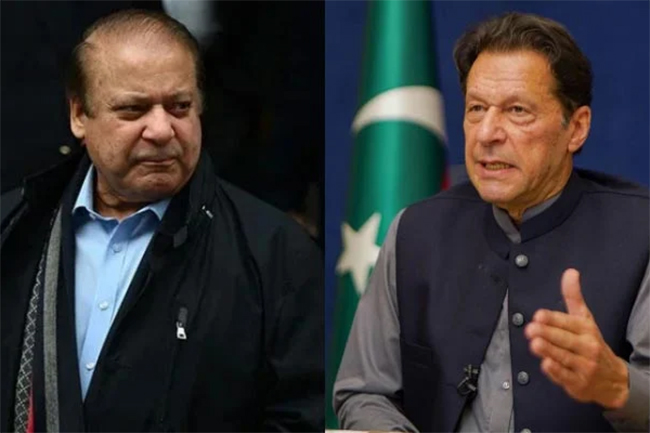Pakistan election: Imran Khan and Nawaz Sharif each claim advantage
February 10, 2024 08:03 am
The jailed former Pakistani prime minister Imran Khan has claimed victory in Thursday’s general election and called on his supporters to celebrate.
Independent candidates linked to him have won most seats so far, with the majority of seats declared.
But another ex-PM, Nawaz Sharif, says his party has emerged the largest and urges others to join him in coalition.
No group or party appears on course to win an overall majority. The final results are yet to be announced.
In a staunch video message posted on X created using AI, Mr Khan claimed his Pakistan Tehreek-e-Insaf (PTI) party had won a “landslide victory” despite what he has called a crackdown on his party.
He is currently in jail having been convicted in cases he says are politically motivated.
The success of the PTI-linked candidates was unexpected, with most experts agreeing that Mr Sharif - believed to be backed by the country’s powerful military - was the clear favourite.
But the PTI is not a recognised party after being barred from running in the election, so technically Mr Sharif’s PML-N is the largest official political group.
So now the political horse-trading begins in earnest, which means it could still be a while before anyone is able to claim outright victory.
In a speech on Friday, Mr Sharif acknowledged that he did not have the numbers to form a government alone. But addressing supporters outside his party’s headquarters in the city of Lahore, he urged other candidates to join him in a coalition and said he could remove the country from difficult times.
Speaking to the BBC’s Newsnight programme on Friday, Mr Khan’s former special assistant Zulifkar Bukhari said: “Knowing Imran Khan and knowing the ethos of our political party PTI, I don’t think we’ll be making any coalition, forming a government with any of the main parties.
“However, we will be forming a coalition... to be in parliament - not as an independent but under one banner, one party”.
And asked about whether Mr Khan could potentially be released, Mr Bukhari said: “I think the minute we go to the high court and the supreme court we are extremely confident that he will be released, and a lot of the charges - if not all - will be thrown out on legal merit and procedural merit.”
The third biggest party appears to be the Pakistan People’s Party led by Bilawal Bhutto, the son of PM Benazir Bhutto who was assassinated in 2007.
As results trickled in, the UK and US voiced concerns over restrictions on electoral freedoms during the vote.
British Foreign Secretary David Cameron said the UK urged authorities in Pakistan “to uphold fundamental human rights including free access to information, and the rule of law”.
In a statement, he went on to express “regret that not all parties were formally permitted to contest the elections”.
Meanwhile, US State Department spokesman Matthew Miller criticised what he described as “undue restrictions on freedoms of expression, association, and peaceful assembly” during Pakistan’s electoral process.
He also cited “attacks on media workers” and “restrictions on access to the internet and telecommunication services” as reasons to worry about “allegations of interference” in the process.
Many analysts have said this is among Pakistan’s least credible elections.
Voters in Lahore told the BBC that the internet blackout on polling day meant it was not possible to book taxis to go and vote, while others said they could not co-ordinate when to head to polling stations with their family members.
An interior ministry spokesman said the blackouts were necessary for security reasons.
Support from the military in Pakistan is seen as important to succeed politically, and analysts believe Mr Sharif and his party currently have their backing, despite their differences in the past.
Maya Tudor, associate professor at the University of Oxford’s Blavatnik School of Government, said the lead taken by Imran Khan’s PTI was “shocking” in the context of the country’s past.
“A win would be remarkable - in every single other election in Pakistan’s recent history, the military’s preferred candidate has won,” Dr Tudor explained.
As many as 128 million people were registered to cast their votes, almost half of whom were under the age of 35. More than 5,000 candidates - of whom just 313 are women - contested 266 directly-elected seats in the 336-member National Assembly.
Pakistan’s former ambassador to the United States, Maleeha Lodhi, said Pakistan “desperately” needs political stability to address what she described as “the worst economic crisis in its history”.
But, in a hopeful note, Ms Lodhi said Pakistan’s voter numbers show a “belief in the democratic process”.
Source: BBC
-Agencies












